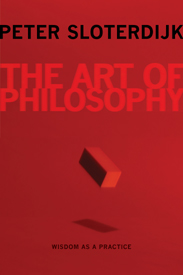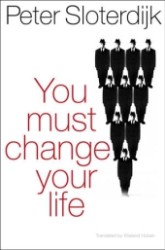I’ve updated my bibliography of Sloterdijk’s writings in English again: see the post. Not much has appeared recently, except the arrival of two monographs: The Art of Philosophy: Wisdom as a Practice (2012) and You Must Change Your Life: On Anthropotechnics (2013).
Tag Archives: You Must Change Your Life
Sloterdijk says “You Must Change Your Life!”
From the Goethe Institute, a brief introduction to Peter Sloterdijk’s book on autopoeisis, You Must Change Your Life!, (apparently) forthcoming from Polity Press:

Peter Sloterdijk – Portrait of an Admonisher [excerpt; silently edited]
Don’t you consume too much energy? Aren’t you after a quick buck? Don’t you constantly lie to others? “You must change your life!” In March 2009, at the height of the financial crisis that began in September 2008, Peter Sloterdijk, one of the best known and also most controversial German philosophers, published a book with this timely call for transformation as the title [see Du mußt dein Leben ändern: Über Anthropotechnik (Suhrkamp, 2009)]. No wonder it struck a chord.
In the book, Sloterdijk develops his doctrine of human beings, who, he argues, possesses no naturally fixed essence, as the great religions postulate they do. On the contrary, human beings creates themselves, as Nietzsche and the existentialists thought. This activity must, however, be learned. That means it must be practised: human beings, according to Sloterdijk, are practising beings. They create themselves through their actions — an insight that the young Karl Marx in 1844 also espoused. Sloterdijk, however, expands the zone of practice beyond the scope conceived of by Marx: not only as workers, but also as models, as feeling and communicating beings, human beings are in training to achieve peak performance. At any rate on this point, Sloterdijk’s thought is not traditional.
What has this to do with the financial crisis of 2008? Well, when human beings are conceived of as practising and self-creating beings, they will naturally be responsible for their own lives. They must (and can!) respond to the global crisis by changes in their own lives, in the financial world as in the environment. In this way the “crisis” has taken the place of gods and gurus, who in earlier times confronted human beings with similarly tremendous demands.
In order to pursue the prospect of common survival, Sloterdijk calls for the building of a global immune system, which he calls “co-immunism” [i.e., a system of mutual protection from social contagion, i.e., against commun(al)ism]. In this he does not propose to rely on force, but rather, as does liberalism, on the hope in human beings’ ability to reason, which makes them see their duty.
The title is a line from Rilke’s “The Archaic Torso of Apollo” (New Poems [1907], trans. Stephen Cohn):
Archaischer Torso Apollos
Wir kannten nicht sein unerhörtes Haupt,
darin die Augenäpfel reiften. Aber
sein Torso glüht noch wie ein Kandelaber,
in dem sein Schauen, nur zurückgeschraubt,sich hält und glänzt. Sonst könnte nicht der Bug
der Brust dich blenden, und im leisen Drehen
der Lenden könnte nicht ein Lächeln gehen
zu jener Mitte, die die Zeugung trug.Sonst stünde dieser Stein entstellt und kurz
unter der Schultern durchsichtigem Sturz
und flimmerte nicht wie Raubtierfelle;und bräche nicht aus allen seinen Rändern
aus wie ein Stern: denn da ist keine Stelle,
die dich nicht sieht. Du mußt dein Leben ändern.Archaic Torso of Apollo
We cannot know his legendary head
with eyes like ripening fruit. And yet his torso
is still suffused with brilliance from inside
like a lamp, in which his gaze, now turned to low,gleams in all its power. Otherwise
the curved breast could not dazzle you so, nor could
a smile run through the placid hips and thighs
to that dark center where procreation flared.Otherwise this stone would seem defaced
beneath the translucent cascade of the shoulders
and would not glisten like a wild beast’s fur:would not, from all the borders of itself,
burst like a star: for here there is no place
that does not see you. You must change your life.


